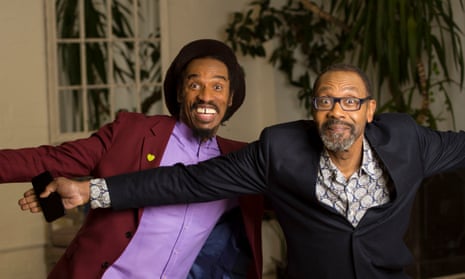‘My first misery / Is when I embark at Piccadilly …” So runs The Underground Train, released by the “king of calypso”, Lord Kitchener, two years after arriving from Trinidad and Tobago at Tilbury docks on the Empire Windrush in 1948. It is as neat a fusion of cultures as you could hope to hear. If it could be piped into all tube stations until the rail strike is over, it might help keep us sane.
Lenny Henry’s mum would have been pleased with Lord Kitchener’s efforts. Her son’s new documentary, Lenny Henry’s Caribbean Britain (BBC Two) – a companion piece to 2018’s The Commonwealth Kid, in which he travelled to Jamaica to examine his roots – opens with his memory of her urging all her children to integrate. Henry’s mother was the kind you sought to obey at all times, so he did. The wider question he poses in this two-parter is how much those coming from other countries lose or gain by trying to “fit in”.
What follows is a controlled explosion of joy, suffused with Henry’s warmth and generosity of spirit. The history of Caribbean contributions to British culture is told through thoughtful parsings of personal experiences and interviews with a variety of famous faces and academics who share Henry’s heritage.
Dr Mykaell Riley, the director of the Black Music Research Unit at Westminster university, and the musicians Alexander D Great and Billy Ocean take us through the origins of calypso. It was like a news network among Caribbean villages – a precursor, as Henry points out, to hip-hop, which Public Enemy’s Chuck D has described as “CNN for black folk”.
They discuss its popularity after it was introduced to the UK, with the Guyanese actor and singer Cy Grant becoming a regular contributor to Look Around With Cliff Michelmore in the late 1950s, and how none of it seemingly had any effect on the degree of acceptance Caribbean immigrants experienced. It was the era of “No dogs, no blacks, no Irish” and the Notting Hill race riots.
A little later, another Caribbean musical import – ska – came into favour. The entrepreneur and musician Levi Roots remembers a world filled with two types of skinhead: those who imitated their musical heroes and were eager to ask him questions about reggae and ska; and the “bovver boys” who feted the National Front and wanted to kick his head in. “That was a hard one for me to understand, a hard one for me to juggle,” says Roots.
Racism surely curtailed the acting career of Edric Connor, who was born in Trinidad and Tobago. He was the first black person to perform with the Royal Shakespeare Company (as Gower in Pericles), but could not find work he wanted thereafter. Instead, he formed an agency dedicated to representing black talent and later founded one of the UK’s earliest black theatre groups.
Despair at truncated ambitions, or dwelling on the energy spent monitoring the world for danger, is not on the agenda here. The points are made unapologetically, then the viewer is moved on. The programme fills up with potted histories of activists such as Claudia Jones, who organised the town hall concert for victims of the riots that evolved into the Notting Hill carnival, and contributions from people in other areas of life: Althea McNish’s Caribbean-influenced textile design taking the art and fashion world by storm; Benjamin Zephaniah’s poetry; the inroads made by black actors and writers into film and TV.
The latter, of course, includes Henry, who speaks about starting out by getting the “joke” of his blackness out of the way, then gradually finding his comic voice and quieting the urge to placate a white audience before every performance.
It is a celebratory piece that trusts the wealth of facts and footage of Caribbean contributions to UK culture to make its mark. The contrast of that outpouring with the poisonous rhetoric and policies that characterise the immigration debate and the government’s increasingly inhumane actions today is unmistakeable. As deportation planes idle on runways, awaiting the disapplication of human rights law to enable them to head for Rwanda, the heft and importance of Henry’s programme is only amplified.
